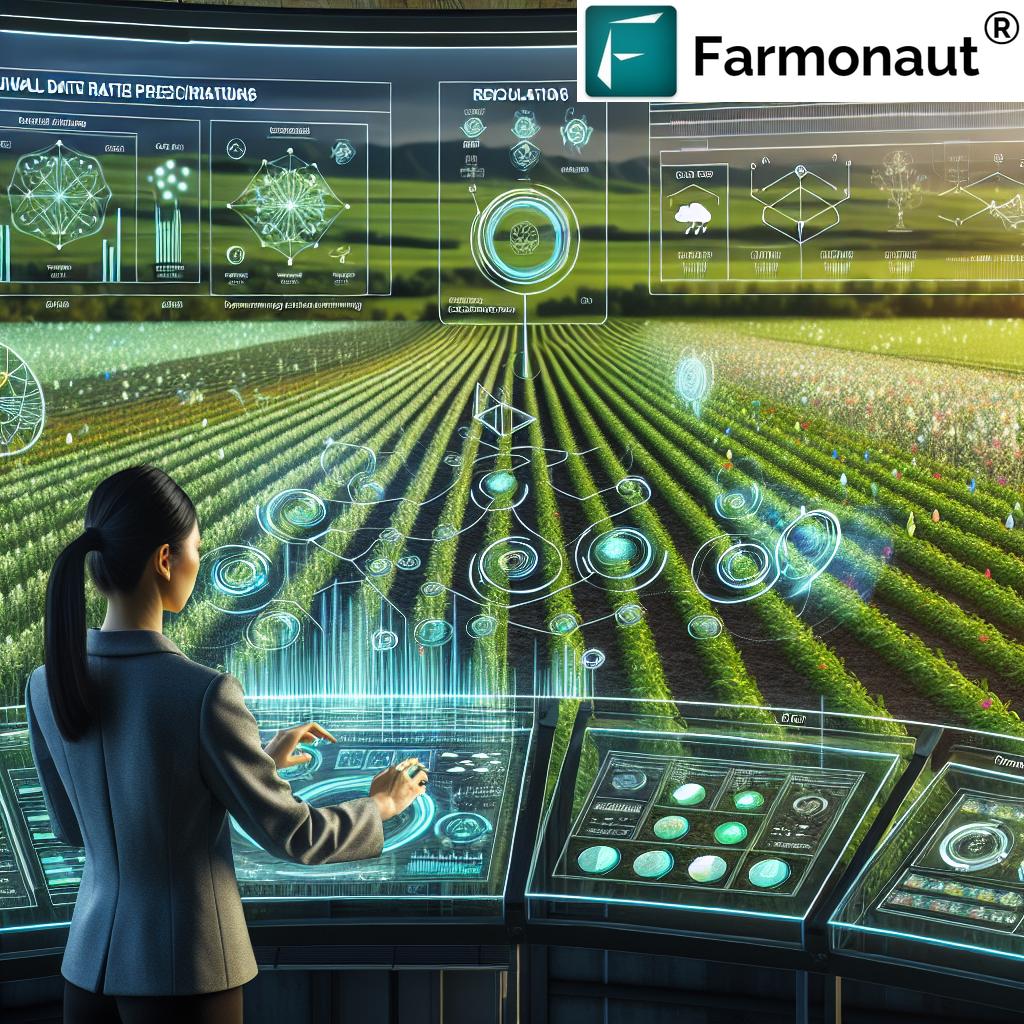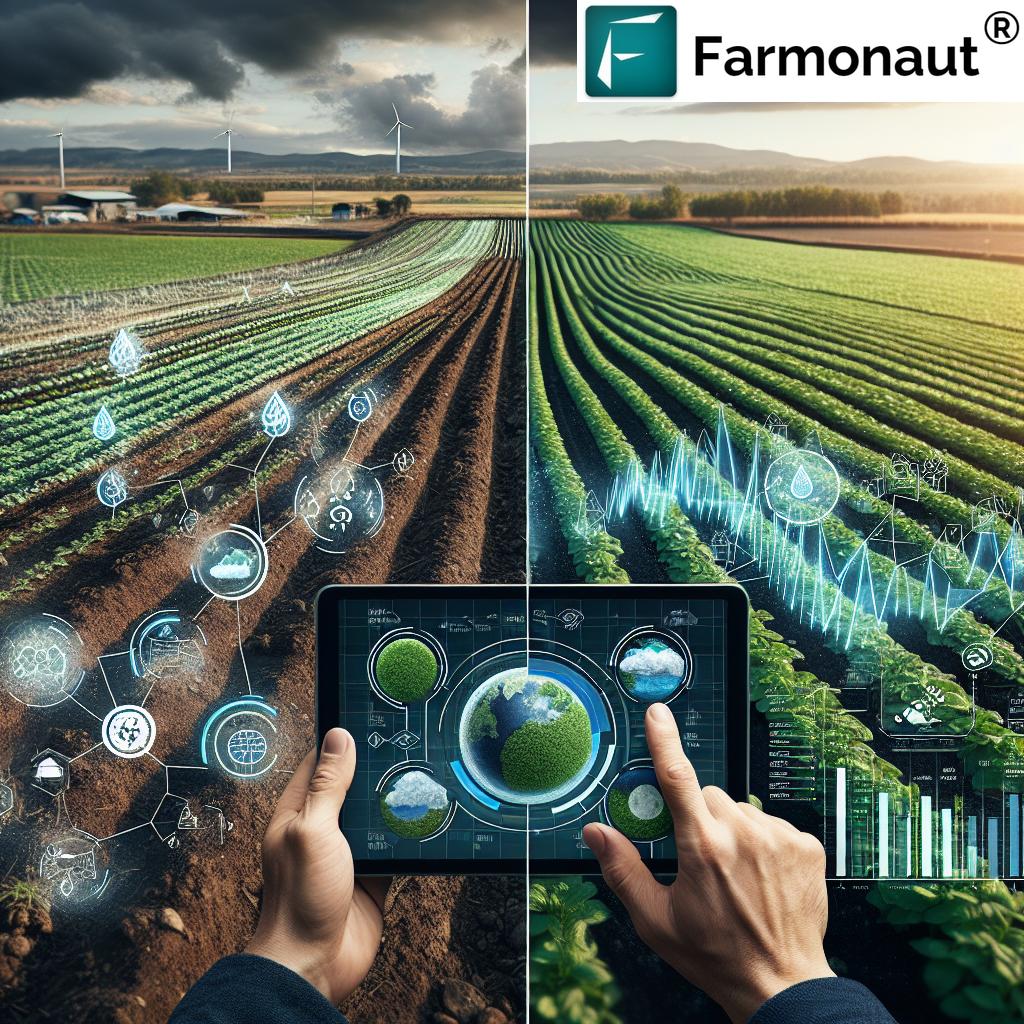Revolutionizing Agriculture: How Data Science and Precision Technology Are Shaping Sustainable Farming Practices
“Data-driven agriculture can reduce water usage by up to 30% while increasing crop yields by 20%.”
In the ever-evolving landscape of modern agriculture, we are witnessing a remarkable transformation driven by the convergence of data science and precision technology. As we delve into this exciting realm, we’ll explore how these innovative approaches are reshaping sustainable farming practices and paving the way for a more efficient, productive, and environmentally conscious agricultural sector.
The Dawn of Data-Driven Agriculture
The integration of data science in agriculture has ushered in a new era of farming, where decisions are no longer based solely on tradition and intuition but are increasingly informed by precise, data-driven insights. This shift towards agricultural data analytics is revolutionizing every aspect of farm management, from soil preparation to harvest planning.
- Enhanced Crop Monitoring: Satellite imagery and IoT sensors provide real-time data on crop health and soil conditions.
- Predictive Analytics: Advanced algorithms forecast weather patterns and potential pest outbreaks, allowing for proactive measures.
- Resource Optimization: Data-driven insights help farmers make informed decisions about water usage, fertilizer application, and pest control.
At Farmonaut, we’re at the forefront of this agricultural revolution, leveraging cutting-edge technology to empower farmers with the tools they need to thrive in this data-rich environment.

Precision Agriculture: The Cornerstone of Modern Farming
Precision agriculture technology stands as a testament to the power of innovation in farming. By leveraging GPS, remote sensing, and IoT devices, farmers can now manage their fields with unprecedented accuracy and efficiency.
- Variable Rate Technology: Allows for precise application of inputs based on specific field conditions.
- GPS-Guided Machinery: Ensures accurate planting, spraying, and harvesting, reducing overlap and wastage.
- Drone Technology: Provides high-resolution imagery for crop monitoring and analysis.
These technologies not only boost productivity but also contribute significantly to sustainable farming practices by optimizing resource use and minimizing environmental impact.
The Role of AI in Crop Management Solutions
Artificial Intelligence (AI) is revolutionizing crop management, offering solutions that were once thought impossible. AI-powered systems analyze vast amounts of data to provide actionable insights, enhancing decision-making processes across the agricultural spectrum.
- Disease Detection: AI algorithms can identify plant diseases early, allowing for timely intervention.
- Yield Prediction: Machine learning models forecast crop yields with increasing accuracy, aiding in harvest planning and market strategies.
- Automated Irrigation: AI-controlled systems optimize water usage based on real-time soil moisture data and weather forecasts.
Our Jeevn AI Advisory System at Farmonaut exemplifies the power of AI in agriculture, delivering personalized recommendations to farmers based on comprehensive data analysis.
Experience AI-powered farming with Farmonaut

Digital Farming Platforms: Bridging the Gap
Digital farming platforms are the linchpin in the modern agricultural ecosystem, seamlessly connecting various technologies and data sources to provide a holistic view of farm operations. These platforms serve as centralized hubs for data collection, analysis, and decision support.
- Integrated Data Management: Consolidates information from multiple sources, including satellite imagery, weather stations, and soil sensors.
- User-Friendly Interfaces: Make complex data easily accessible and interpretable for farmers of all technological backgrounds.
- Cloud-Based Solutions: Enable real-time collaboration and data access from anywhere, enhancing farm management efficiency.
Farmonaut’s digital platform exemplifies this integration, offering a comprehensive suite of tools that empower farmers to make data-driven decisions with confidence.
Explore Farmonaut’s API for seamless integration
“Precision farming techniques have been shown to decrease fertilizer use by 15% and pesticide application by 10%.”
Smart Farming Techniques: The Future of Agriculture
Smart farming techniques represent the pinnacle of agricultural innovation, combining data science, IoT, and automation to create highly efficient and sustainable farming systems.
- Autonomous Vehicles: Self-driving tractors and harvesters optimize field operations and reduce labor costs.
- Robotic Systems: Perform tasks such as weeding and harvesting with precision, reducing the need for chemical interventions.
- Smart Greenhouses: Control environmental conditions automatically, maximizing crop growth and resource efficiency.
These advanced techniques are not just improving productivity; they’re reshaping the very nature of farming, making it more sustainable and resilient in the face of climate change and resource scarcity.
Field Performance Optimization: Maximizing Yield and Sustainability
Optimizing field performance is crucial for sustainable agriculture, and data science plays a pivotal role in achieving this goal. By analyzing multiple data points, farmers can fine-tune their practices to maximize yield while minimizing environmental impact.
- Soil Health Management: Data-driven insights help maintain optimal soil conditions for crop growth.
- Precision Planting: Ensures optimal seed placement and spacing for maximum yield potential.
- Resource Allocation: Helps farmers allocate resources efficiently based on field-specific needs.
At Farmonaut, our satellite-based crop health monitoring system provides farmers with the tools they need to optimize their field performance continuously.
Access Farmonaut’s API Developer Docs for advanced integrations
Agricultural Sustainability Technologies: Balancing Productivity and Conservation
As we face the challenges of feeding a growing global population while preserving our planet’s resources, agricultural sustainability technologies have become indispensable. These innovations help strike a balance between productivity and environmental conservation.
- Precision Irrigation: Reduces water waste while ensuring optimal crop hydration.
- Integrated Pest Management: Minimizes pesticide use through targeted interventions.
- Carbon Sequestration Techniques: Help offset greenhouse gas emissions from agricultural activities.
Farmonaut’s carbon footprinting feature is an example of how technology can help agribusinesses monitor and reduce their environmental impact, promoting more sustainable farming practices.
The Impact of Remote Sensing in Agriculture
Remote sensing technology has revolutionized how we monitor and manage agricultural lands. By providing detailed, timely information about crop health and field conditions, remote sensing enables more precise and effective farm management.
- Crop Health Assessment: Multispectral imagery reveals crop stress before it’s visible to the naked eye.
- Yield Forecasting: Satellite data helps predict crop yields with increasing accuracy.
- Land Use Mapping: Assists in optimal land allocation and crop rotation planning.
Farmonaut’s satellite-based monitoring system leverages the power of remote sensing to provide farmers with actionable insights, enabling them to make informed decisions about their crops and resources.
Blockchain in Agriculture: Ensuring Transparency and Traceability
Blockchain technology is making significant inroads in agriculture, particularly in supply chain management and product traceability. This innovative approach ensures transparency and builds trust among consumers and stakeholders.
- Supply Chain Transparency: Allows tracking of products from farm to table.
- Food Safety: Enables quick identification of contamination sources in case of outbreaks.
- Fair Trade Practices: Ensures farmers receive fair compensation for their products.
Farmonaut’s blockchain-based traceability solution exemplifies how this technology can be applied to enhance trust and efficiency in agricultural supply chains.
The Role of Big Data in Agricultural Decision-Making
Big data analytics is transforming agricultural decision-making processes, enabling farmers to make more informed choices based on comprehensive, data-driven insights.
- Market Trend Analysis: Helps farmers align production with market demands.
- Risk Assessment: Identifies potential risks and suggests mitigation strategies.
- Resource Allocation: Optimizes the use of inputs based on historical and real-time data.
By harnessing the power of big data, farmers can improve their operational efficiency, reduce costs, and increase profitability while promoting sustainable practices.
Precision Agriculture Technologies and Their Impact
| Technology | Description | Benefits | Estimated Impact on Yield |
|---|---|---|---|
| Satellite Imagery | High-resolution images for crop monitoring | Early detection of crop stress, precise field mapping | 5-10% increase |
| IoT Sensors | Real-time data on soil and environmental conditions | Optimized irrigation, fertilization, and pest control | 10-15% increase |
| Drones | Aerial imaging and targeted application of inputs | Precise crop scouting, reduced chemical use | 7-12% increase |
| AI-powered Crop Analysis | Advanced algorithms for crop health assessment | Early disease detection, yield prediction | 15-20% increase |
| Variable Rate Technology | Precise application of inputs based on field variability | Reduced input costs, improved resource efficiency | 10-30% increase |
The Future of Sustainable Agriculture
As we look to the future, the integration of data science and precision technology in agriculture promises to drive even greater advancements in sustainable farming practices. We anticipate several key developments:
- Advanced AI and Machine Learning: More sophisticated algorithms will provide even more accurate predictions and recommendations.
- Increased Automation: Robotic systems will become more prevalent, further optimizing farm operations.
- Enhanced Data Integration: Improved connectivity will allow for seamless data flow between various agricultural technologies.
- Personalized Crop Management: Tailored solutions based on individual farm characteristics and farmer preferences.
At Farmonaut, we’re committed to staying at the forefront of these innovations, continually evolving our platform to meet the changing needs of farmers and the agricultural industry as a whole.
Conclusion: Embracing the Agricultural Revolution
The convergence of data science and precision technology is undeniably revolutionizing agriculture, paving the way for more sustainable, efficient, and productive farming practices. As we’ve explored throughout this blog, these innovations are not just enhancing crop yields and resource management; they’re fundamentally changing how we approach agriculture in the face of global challenges like climate change and food security.
From satellite-based crop monitoring to AI-powered advisory systems, from blockchain-enabled traceability to advanced data analytics, the tools at our disposal are more powerful than ever. At Farmonaut, we’re proud to be part of this agricultural revolution, providing farmers with the cutting-edge solutions they need to thrive in this new era of data-driven farming.
As we move forward, the key to success lies in embracing these technologies and integrating them into our farming practices. By doing so, we can create a more sustainable, resilient, and productive agricultural sector that benefits farmers, consumers, and the planet alike.
FAQ Section
Q: How does data science improve agricultural sustainability?
A: Data science enhances agricultural sustainability by optimizing resource use, reducing waste, and enabling precise application of inputs like water and fertilizers. It also helps in early detection of crop diseases and pests, minimizing the need for chemical interventions.
Q: What is precision agriculture, and how does it benefit farmers?
A: Precision agriculture is a farming management concept that uses technology to observe, measure, and respond to variability in crops. It benefits farmers by improving crop yields, reducing costs, and minimizing environmental impact through more efficient use of resources.
Q: How do satellite imagery and remote sensing contribute to modern farming?
A: Satellite imagery and remote sensing provide farmers with valuable data on crop health, soil moisture, and field conditions. This information enables more accurate decision-making in areas such as irrigation, fertilization, and harvest timing.
Q: Can small-scale farmers benefit from agricultural technology?
A: Yes, small-scale farmers can benefit significantly from agricultural technology. Many solutions, like Farmonaut’s platform, are designed to be accessible and affordable, allowing small farmers to improve their productivity and sustainability without large capital investments.
Q: How does AI contribute to crop management?
A: AI contributes to crop management by analyzing vast amounts of data to provide insights and predictions. It can help in disease detection, yield forecasting, and optimizing resource allocation, among other applications.






